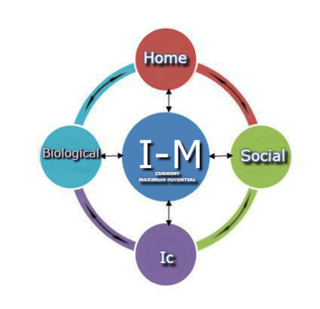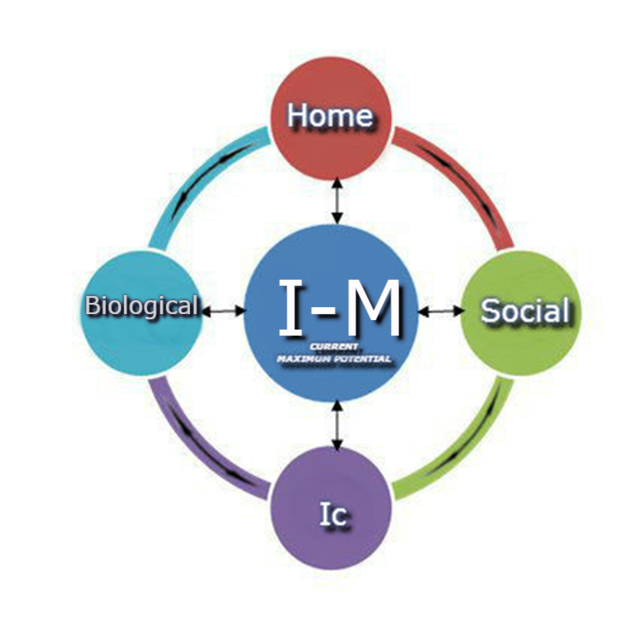Trust
No One is Sick or Broken: The I-M Approach
This paradigm shift challenges the very concept of disease.
Posted December 20, 2019 Reviewed by Ekua Hagan
I believe we are always doing the best we can. I call this our I-M. This is who I am and I Matter. Our I-M is always adapting to Four Domains: our Home Domain, our Social Domain, our Biological Domain of our brain and body, and our Ic Domain, or how I see myself and how I think other people see me. Using the I-M lens, there is no pathology. There is only our I-M, doing the best we can at this moment in time, adapting to a shift in any of the Domains to another I-M.

Most of us at some time have thought we should be doing better. We get down on ourselves, experience self-hate or doubt. Beat ourselves up for making a mistake, for failing, for having less value. This makes us feel horrible. And to avoid or mask or at least feel some pleasure we may eat a bucket of ice cream or drink a bucket of gin. We may drown ourselves in an ocean of inadequacy.
But what if even that is the best we can do at that moment? Even being hard on ourselves is an I-M, our current maximum potential. I believe we are always doing the best we can at every moment but with the potential to change in the very next moment to another best we can, another I-M. Even if it means self-criticism.
How does this approach change us? What happens when we wonder why we do what we do instead of worry about why we do what we do?
In medicine, we have spent a lot of time wondering why people are sick. In medicine, we diagnose disease, dis-ease. We call people invalids, in-valid. We say people have a disorder, dis-order, separating them into two groups, one that is ordered and one that is not. Mental disorders. substance abuse disorder. And then we are astonished there is such a thing as stigma.
But there is no pathology. Everything we have labeled as sick is actually a response of our cells to their environment. Change the environment, change the response. We are in a continual adaption to the world around and within us: an I-M.
You don’t have to like your I-M. You don’t have to condone your I-M. Your I-M is not a free ride: You will be held responsible because everything you do has a natural consequence. And your I-M may not even lead to success. For some people, success is when you love going to work and love going home. For some people, success is having food in the refrigerator. For some people, success is having a home to have a refrigerator. For some people, success is just waking up. You decide what success means to you.
But instead of judging yourself and others as not doing the best they can, that they should be doing better, that they are broken, or that they have less value, let’s look again at why we do what we do based on the influence of the Four Domains. Let’s look again at how we are trying to adapt.
Think about the words “look again.” “Again look.” Again, as in to repeat something; look as in spectator. The I-M is saying let’s again look, or re-spect, why we do what we do without judgment. We're simply doing the best we can at this moment in time in response to the influence of the Four Domains.
When is the last time you got angry at someone treating you with respect?
You don’t.
Anger is an emotion designed to change things. We get angry when we want someone to do something different. To start doing something or to stop doing something. But being respected feels great so we don’t get angry.
Respect leads to value which is what everyone wants. Think about every person you have ever met. Every one of them wants to feel valuable. No matter how young or old, rich or poor, no matter the color of your skin or your ethnicity, your political party or your gender, feeling valued by another person is the common thread that binds us all. It is part of the essence of being a human, social, animal.
What’s cool is, at any and every moment in time you can remind someone of their value. And every time you remind someone of their value you increase your own value. And everyone wants to feel valued.
Respect leads to value and value leads to trust. Trust is the antidote to fear and anger and sadness because when you trust someone you can take a chance, be creative, make a mistake, be honest, be yourself, and not fear that you will be judged as less than, with less value.
The I-M Approach has two principles. The first principle of the I-M Approach is that you control no one but influence everyone. Everyone has an I-M, interested in what you think or feel about them through their Ic Domain. You are part of someone’s Home or Social Domain and can make a small change in their Biological Domain based on how they perceive you are treating them because you know it feels different when you are treated with respect or disrespect. You control no one but influence everyone and you get to choose the influence you want to have. When you truly look at someone at an I-M you don’t have to like it but instead of going limbic you can keep it frontal and wonder why they do what they do, to look again at their action based on the influence of the Four Domains.
What kind of influence do you want to have?
The second principle of the I-M Approach is that small changes can have big effects. If you don’t like your I-M you can change it. But you don’t need to change everything. You can make a small change in any of the Domains and have a ripple effect through the whole system.
Changing something is a different word than treating something.
What small change do you want to make today to move your I-M closer to your own personal definition of success?
What I try to remind people is that they are doing the best they can. They don’t need “treatment” because no one is sick. What they may need is to change their perception, how they see themselves, and how they think others see them. And they need a roadmap on how to do it.
The I-M Approach is that roadmap. The I-M Approach takes the chaos of life and helps a person make sense of who they are and why they do what they do. Knowledge is power. Once you know why you do something you can change it if you want to. How are you meant to change something if you don’t know why you are doing it to begin with? The I-M Approach teaches a person how to manage their life, not just cope with it. The I-M Approach roadmap provides a plan where small changes can have big effects.

References
Shrand MD, J, Devine, L Do You Really Get Me? Hazelden Press 2015
Shrand MD, J Devine, L Outsmarting Anger: Seven Strategies to defuse our Most Dangerous Emotion. Josey-Bass 2013 (Best Psychology Book of the Year Award Winner, Books for a Better Life 2013)




